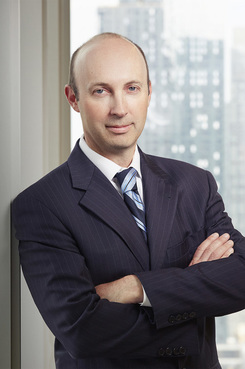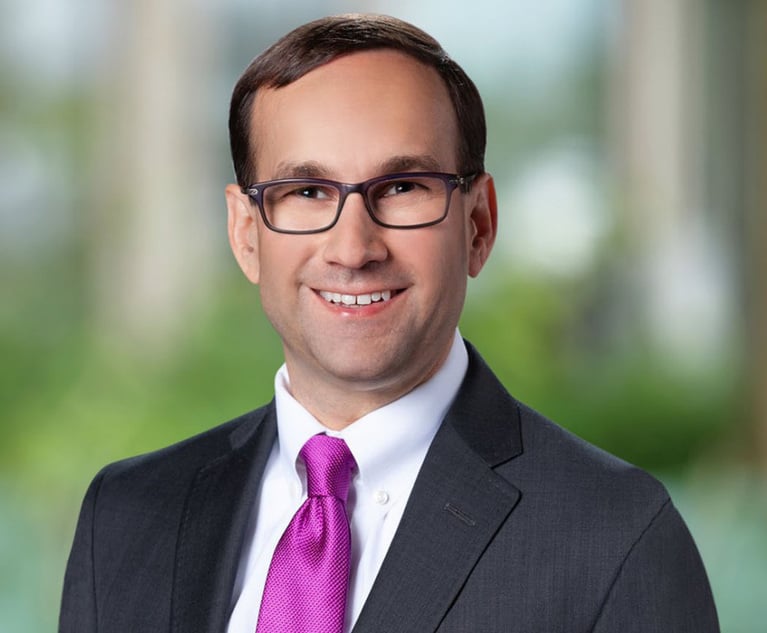After Years of a 'Wild Ride,' Teva CLO Makes Cuts for Sake of Stability
David Stark, executive vice president and chief legal officer of financially strapped Teva Pharmaceutical Industries, based in Teva's U.S. headquarters in Parsippany, New Jersey, had to cut his legal staff by 40 percent since 2017 as part of cost-cutting at the Israel-based company. "It was super difficult and hard on morale.” He also plans reductions in outside legal spending.
November 12, 2018 at 05:07 PM
6 minute read
 David Stark of Teva.
David Stark of Teva.
David Stark, executive vice president and chief legal officer of financially strapped Teva Pharmaceutical Industries, said he feels like he can breathe easier for the first time in years thanks to a new CEO who is working to bring stability to the company.
Stark has been with Israel-based Teva, the world's largest generic drug manufacturer, since 2002. “And it's been a fairly wild ride,” he said in a recent interview with Corporate Counsel.
“Every day when you came into the office, you didn't know what to expect. But the new CEO is a breath of fresh air, improving the business margins, making smart decisions. The environment has stabilized after many years.”
It wasn't painless. CEO Kare Schultz, who took over in November 2017, started by slashing 25 percent of the company's 56,000 employee base. He promised to cut costs by $3 billion by the end of 2019.
While dealing with all the legal work that goes along with downsizing and restructuring a company, Stark's law department endured its own major cuts. Stark, based in Teva's U.S. headquarters in Parsippany, New Jersey, had to cut his legal staff by 40 percent, taking it from 400 employees to about 240.
Stark, who was named CLO in November 2016, didn't want to elaborate on the details of his cuts, but said “basically I did it across the board, starting with my direct team.”
He said the transaction area was easiest to cut, because the company had called a halt on merger and acquisition activity until it is better financially situated.
“We didn't use any outside experts,” Stark said. “I worked closely with my senior management team and my human resources partner. We just rolled up our sleeves. It was super difficult and hard on morale.”
He said the patent and litigation areas are critical to Teva, and he tried to protect them as much as possible. “A fair amount of legal attention is directed into corporate governance as well,” he added.
Part of that governance work is cooperating with a corporate monitor imposed for three years under a December 2016 deferred prosecution agreement with the U.S. Department of Justice. The monitor is Gil Soffer, a former federal prosecutor who is managing partner in the Chicago office of Katten Muchin Rosenman.
Under the agreement, Teva agreed to pay abut $520 million to resolve criminal and civil charges over bribes to government officials in Russia, Ukraine and Mexico, in violation of the Foreign Corrupt Practices Act. DOJ said then it was the largest criminal fine ever imposed against a drug company for violations of the FCPA.
“Working with the monitor is going smoothly, but it is a challenge,” Stark said.
The DPA forced Teva to enhance its compliance efforts. Stark said the compliance unit was split off from the legal department, but they still work closely together.
“I talk every day with the chief compliance officer. I have lawyers on her teams, and she has compliance people embedded in mine. We work arm in arm.”
➤ Stay on top of in-house developments with Inside Track, a weekly email briefing that breaks down the news, flags key issues and keeps track of who's on the move. Learn more.
Prior to joining Teva, Stark was an associate attorney in the litigation departments at Willkie Farr & Gallagher from 1998 to 2002; Chadbourne & Parke from 1997 to 1998; and Haight, Gardner, Poor & Havens between 1994 and 1997.
He said Teva is on track to meet its financial goals for 2018 and 2019, and the company's third- quarter financial report to the U.S. Securities and Exchange Commission on Nov. 1 supported that view. It has already recorded a cost reduction of $1.8 billion in the first nine months of this year, and said it expects to meet the $3 billion goal by the end of next year, while continuing to pay down debt. Though the quarter showed a $273 million loss, the future outlook for growth after 2019 was positive based on its restructuring.
The legal department will do its share to make more cuts in 2019, Stark said, but this time in its external spend.
“As a heavily regulated industry, it's fair to say our external spend on outside law firms is significant,” he noted.
He has a three-prong plan to reduce outside legal costs: First, Stark said he wants to reduce the number of outside law firms he uses, but give them a higher volume of the work, hoping to receive significant fee discounts in return.
Second, he plans to strip out legal work that can be done in-house or outsourced to less expensive vendors, such as document reviews, and focus “the high-priced law firms on higher-end legal work.”
Third is investing more in technology platforms, including one to help manage outside law firm work and costs.
Stark believes his legal department and his company are on the right track, but he acknowledged that there is much work to be done before the company can claim complete financial stability. If all goes well by the end of 2019, Teva could be well on its way to significantly reducing its $30 billion debt load and ending its DPA and corporate monitor.
“Finally we have a clear idea of what our goals are, where we are headed, and what we need to do to meet our commitments,” Stark said.
Read more from the archives:
This content has been archived. It is available through our partners, LexisNexis® and Bloomberg Law.
To view this content, please continue to their sites.
Not a Lexis Subscriber?
Subscribe Now
Not a Bloomberg Law Subscriber?
Subscribe Now
NOT FOR REPRINT
© 2025 ALM Global, LLC, All Rights Reserved. Request academic re-use from www.copyright.com. All other uses, submit a request to [email protected]. For more information visit Asset & Logo Licensing.
You Might Like
View All
FTC Launches Inquiry of Single-Family Rental Home 'Mega Investors,' Issues PBM Report
5 minute read

Baker Botts' Biopharma Client Sues Former In-House Attorney, Others Alleging Extortion Scheme

People and Purpose: AbbVie's GC on Leading With Impact and Inspiring Change
7 minute readTrending Stories
Who Got The Work
J. Brugh Lower of Gibbons has entered an appearance for industrial equipment supplier Devco Corporation in a pending trademark infringement lawsuit. The suit, accusing the defendant of selling knock-off Graco products, was filed Dec. 18 in New Jersey District Court by Rivkin Radler on behalf of Graco Inc. and Graco Minnesota. The case, assigned to U.S. District Judge Zahid N. Quraishi, is 3:24-cv-11294, Graco Inc. et al v. Devco Corporation.
Who Got The Work
Rebecca Maller-Stein and Kent A. Yalowitz of Arnold & Porter Kaye Scholer have entered their appearances for Hanaco Venture Capital and its executives, Lior Prosor and David Frankel, in a pending securities lawsuit. The action, filed on Dec. 24 in New York Southern District Court by Zell, Aron & Co. on behalf of Goldeneye Advisors, accuses the defendants of negligently and fraudulently managing the plaintiff's $1 million investment. The case, assigned to U.S. District Judge Vernon S. Broderick, is 1:24-cv-09918, Goldeneye Advisors, LLC v. Hanaco Venture Capital, Ltd. et al.
Who Got The Work
Attorneys from A&O Shearman has stepped in as defense counsel for Toronto-Dominion Bank and other defendants in a pending securities class action. The suit, filed Dec. 11 in New York Southern District Court by Bleichmar Fonti & Auld, accuses the defendants of concealing the bank's 'pervasive' deficiencies in regards to its compliance with the Bank Secrecy Act and the quality of its anti-money laundering controls. The case, assigned to U.S. District Judge Arun Subramanian, is 1:24-cv-09445, Gonzalez v. The Toronto-Dominion Bank et al.
Who Got The Work
Crown Castle International, a Pennsylvania company providing shared communications infrastructure, has turned to Luke D. Wolf of Gordon Rees Scully Mansukhani to fend off a pending breach-of-contract lawsuit. The court action, filed Nov. 25 in Michigan Eastern District Court by Hooper Hathaway PC on behalf of The Town Residences LLC, accuses Crown Castle of failing to transfer approximately $30,000 in utility payments from T-Mobile in breach of a roof-top lease and assignment agreement. The case, assigned to U.S. District Judge Susan K. Declercq, is 2:24-cv-13131, The Town Residences LLC v. T-Mobile US, Inc. et al.
Who Got The Work
Wilfred P. Coronato and Daniel M. Schwartz of McCarter & English have stepped in as defense counsel to Electrolux Home Products Inc. in a pending product liability lawsuit. The court action, filed Nov. 26 in New York Eastern District Court by Poulos Lopiccolo PC and Nagel Rice LLP on behalf of David Stern, alleges that the defendant's refrigerators’ drawers and shelving repeatedly break and fall apart within months after purchase. The case, assigned to U.S. District Judge Joan M. Azrack, is 2:24-cv-08204, Stern v. Electrolux Home Products, Inc.
Featured Firms
Law Offices of Gary Martin Hays & Associates, P.C.
(470) 294-1674
Law Offices of Mark E. Salomone
(857) 444-6468
Smith & Hassler
(713) 739-1250






